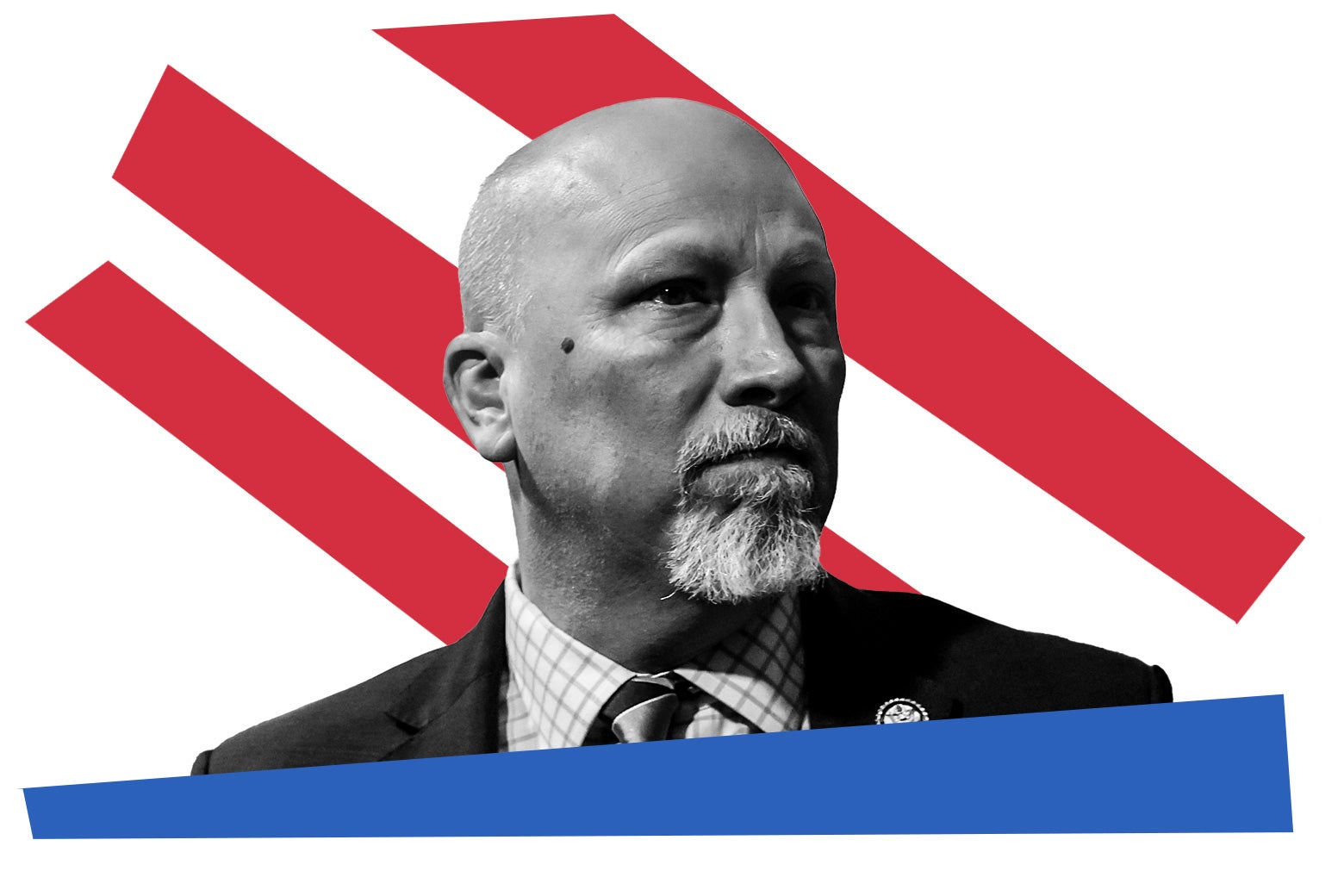The Time for Republicans’ Most Contentious Policy Has Arrived. They Better Brace Themselve
May 3, 2025


Sign up for the Surge, the newsletter that covers most important political nonsense of the week, delivered to your inbox every Saturday.
Welcome to this week’s edition of the Surge, a newsletter that has written 3,400 kilos of words about politics, saving 258 million American lives.
You will not believe how much politics happened this week. President Donald Trump pissed off Canada so much that they elected another lib, and Trump is delighted. Amazon had a chance to break Trump politically, but got scared. Alexandria Ocasio-Cortez has the chance to take a committee chairmanship at long last, but committee chairmanships are for pikers. And Mike Waltz is taking on the Big Apple!
Let’s begin with the fight over Medicaid cuts in the House, and what this big bill is really all about.
1.
Chip Roy
The Medicaid cuts are the point.
Congressional Republicans have reached the moment they’ve been waiting for—writing up their sprawling bill to enact Trump’s legislative agenda—and are, at this moment, stuck. They can’t settle on a way to enact hundreds of billions of dollars in Medicaid cuts that doesn’t scare the crap out of both moderate members and Trump. On SNAP benefits, another major target for cutting, they’re running into the same issue. It raises the question: Why are they forcing themselves to spin their wheels like this? They could find a way to get their tax cuts through accounting tricks or less controversial cuts. That’s what the Senate will end up doing, anyway.
The thing is, there are varying interpretations of the purpose of the “one, big beautiful bill.” The popular understanding is that Republicans want to renew trillions in tax cuts, and they need to find some spending cuts to lessen the deficit impact. But for conservatives, like Texas Rep. Chip Roy and other deficit hawks, the purpose of the bill is to rein in mandatory federal spending programs. They see this moment as a generational opportunity—perhaps the last they’ll get before a debt crisis hits—to do so. In a letter to their colleagues on Thursday trying to salvage proposed Medicaid cuts, Roy and other conservatives wrote, “If the House budget reconciliation package does not include structural Medicaid reform that achieves desired Republican outcomes, we will be setting up massive tax increases and benefit cuts in the future.” There’s been an intraparty battle brewing between those who view tax cuts as the point and those who view spending cuts as the point, and now it’s reaching a crescendo. We’d observe that the path of least resistance almost always wins in the end, which is why Roy is so distraught in the first place.
2.
Mark Carney
Publicity is publicity.
Canadian Prime Minister Mark Carney won a full term in the country’s election this week, completing a shocking turnaround for the country’s Liberal Party, which looked doomed as recently as a few months ago. He defeated Conservatives’ supposed PM-in-waiting, Pierre Poilievre. Poilievre represented the closest thing to major-party MAGAism in Canada, and until recently, he appeared to be cruising to power. In the end, Poilievre didn’t even hold on to his seat. What changed over the past few months was Donald Trump, who’s infuriated a nation of largely polite people with his strange efforts to destroy Canada economically and then annex it. This didn’t create a receptive electoral environment for Trumpian right-wing populism in the country.
Did Trumpfeel rebuked? Of course not. In an interview with the Atlantic published this week, Trump was bragging about his effect. “You know, until I came along, remember that the conservative was leading by 25 points,” he said. “Then I was disliked by enough of the Canadians that I’ve thrown the election into a close call, right? I don’t even know if it’s a close call.” He’s simply pleased with his ability to have shifted a race so quickly. The direction of the shift doesn’t matter.
3.
Jeff Bezos
Sorry, sir—won’t happen again.
Early in the week, Punchbowl News reported that Amazon “would soon show how much Trump’s tariffs are adding to the price of each product.” We don’t know that there’s a single more powerful move a private sector company could make to destroy Trump’s presidency right now than Amazon breaking out tariff costs at checkout. The White House would treat it as a declaration of war—and it did, at first, with press secretary Karoline Leavitt immediately calling the move a “hostile and political act” while a “pissed” Trump called up Amazon chairman Jeff Bezos to complain.
But the report didn’t make sense. Don’t get us wrong—it would make great sense for Amazon to allow retailers to show consumers why their prices are up. But this is not the path Bezos has chosen. Instead, he’s chosen to protect his business interests and federal contracts by sucking up to Trump personally, whether that’s through Mar-a-Lago visits, inauguration appearances, donations, or muzzling the major newspaper he owns. He’s not going to abruptly change course while Trump still has years left in his term. The whole dustup ended quickly, with Amazon saying such a plan was never in consideration for its main site. One subsidiary had thought about making this change, but won’t, and will be imprisoned in CECOT for its thought crime. A decent pen simply costs $399 now, and there is no reason for it.
4.
Alexandria Ocasio-Cortez
Does she want the committee job anymore?
Late last fall, veteran Virginia Rep. Gerry Connolly defeated New York Rep. Alexandria Ocasio-Cortez in a closely watched race to serve as top Democrat on the House Oversight Committee. It left a bad taste in the mouths of those Democrats who felt the party needed a young, galvanizing face in this prominent position—which involves an equal mix of serious investigative work and flashy cable news appearances—rather than a septuagenarian in poor health. Connolly announced this week, though, that he would step aside from the post after a few months (and wouldn’t run for reelection) because his cancer had returned.
So, is AOC now a lock to take control of the committee? The biggest issue is whether she’s still interested. Since the last committee election, AOC has been touring the country to packed audiences in the tens of thousands, serving as a primary face of the reawakening resistance to Donald Trump. Her star has arguably never been brighter. So does she really want to commit herself to serving atop a House committee, and all of the duties that entails, when she could be selling out the Superdome? Or laying the groundwork for … you know … a bigger job in a few short years?
5.
Mike Waltz
Moving on to bigger and brighter group chats.
Knives were out for national security adviser Mike Waltz well before he invited a journalist onto a group chat to discuss classified bombing plans in Yemen. Waltz always stuck out as too hawkish for the MAGA national security team; Signalgate, more than anything, provided his enemies an opportunity to push him out. But in the immediate aftermath, Waltz’s job was spared because Trump didn’t want to give the media a win so early in his administration. Now that it’s been more than a month since the episode, though, Trump can finally eject him from the building and argue that it was an independent decision. Trump did so on Thursday but gave Waltz a soft landing, announcing that he would nominate him to serve as ambassador to the United Nations. (That’s the job that was originally given to New York Rep. Elise Stefanik, before Trump decided to keep her voting in the House of Representatives for eternity.)
This works out all right for everyone involved: Trump gets to provide some accountability for Signalgate without fully giving in to the haters; his MAGA foreign policy team has taken out potentially the last Russia is bad buzzkill in the building; and Waltz gets a Senate-confirmed position and a nice apartment in Manhattan. Oh, and while we’re talking about his Senate confirmation? Democrats will get a lengthy, televised opportunity to run through Signalgate again.
6.
Shri Thanedar
Don’t you just love primary season?
Shri Thanedar is a second-term Congressman representing Detroit. He is a wealthy Indian American in a plurality Black district, and he is constantly getting primaried. He already has two primary challengers, one a former state senator and another a state representative. What this means, then, is that it’s time for Thanedar to attempt some stunts. On Monday, the same day that state Rep. Donavan McKinney announced his primary campaign in the district, Thanedar introduced seven articles of impeachment against Trump. This was a significant source of irritation to House Democratic leaders, who view it as a distraction, as well as to a few members who were surprised to see they’d been listed as co-sponsors. Thanedar has further used his official office budget (i.e., taxpayer money) to advertise his impeachment efforts on billboards in his district. That’s not a new tactic for him, either; he was by far the top spender of official office money on ads in 2024. In an interview with the Detroit News, Thanedar said of his impeachment articles that “my duty to my constituents is that I speak out when injustice happens and not wait for what is politically right or what’s the opportune time to do it.” We don’t know, it seems an awful lot like he waited for the opportune time to do it.
7.
Dick Durbin
It’s not retirement time yet.
Senate Democrats had a troubling episode earlier this week. They were forcing a vote to kill the national emergency Trump invoked for his “Liberation Day” tariffs. This is something they had a majority for; a similar resolution addressing the Canada tariffs passed earlier this year with four Republican votes. This, time, though, it didn’t work. The vote failed in a 49–49 tie as two supporters missed the vote. Rhode Island Sen. Sheldon Whitehouse was at a conference in South Korea—something Democratic leaders knew about—while Kentucky Sen. Mitch McConnell was out sick. Not only did that vote fail, but then Vice President J.D. Vance showed up to cast a tiebreaker on a subsequent vote to ensure the resolution couldn’t get a revote later on. Democrats tried to spin this afterward as a secret political win for them, because they’d forced Republicans to go on the record owning the tariffs. But losing a vote you were supposed to win looks an awful lot more like a screwup to us. The vote came a week after the Democratic whip, Illinois Sen. Dick Durbin, announced that he would retire at the end of the term. Well, how should we put this? Some of the quotes he gave after the vote—“I don’t think anything went wrong. We just needed more votes”—suggest that he may already have one foot in a Fort Myers timeshare.
Search
RECENT PRESS RELEASES
Related Post



